Dell XPS 15 L521X: A Detailed First Look
by Jarred Walton on July 25, 2012 1:10 AM ESTDell XPS 15 General Performance
We start as usual with our general performance application benchmarks. We’re reaching the point where we now have quite a few notebooks in our updated Mobile Benchmark suite, and we’ve tried to select some reasonable comparison points. Given the preliminary nature of our benchmark results (i.e. potential for CPU and/or GPU throttling), we have not yet added the XPS 15 to Mobile Bench, but we will do so when we have a final release BIOS that addresses our throttling concerns. Here’s the list of laptops we’ll be using for our charts, along with a brief overview of their specs. The full specs for each laptop can be found in their respective reviews, which we’ve linked in the table below.
| Laptop Configuration Overview | ||||
| Laptop | CPU | Graphics | Storage | Battery |
| Acer Aspire V3-571G | Intel i7-3610QM | GT640M/HD4000 | HDD | 48Wh |
| Acer Aspire S5 | Intel i7-3517U | HD4000 | SSD | 35Wh |
| Acer TimelineU M3 | Intel i7-2637M | GT640M/HD3000 | SSD | 55Wh |
| AMD Trinity Prototype | AMD A10-4600M | HD7660G | SSD | 56Wh |
| ASUS N56VM (Prerelease) | Intel i7-3720QM | GT630M/HD4000 | HDD/SSD | 56Wh |
| ASUS G74SX-A2 | Intel i7-2630QM | GTX560M/HD3000 | SSD | 90Wh |
| Clevo W110ER | Intel i7-3720QM | GT650M/HD4000 | Hybrid (Seagate) | 62Wh |
| Dell XPS 15 (L521x) | Intel i7-3612QM | GT640M/HD4000 | Hybrid (SRT) | 65Wh |
| Razer Blade | Intel i7-2640M | GT555M/HD3000 | SSD | 60Wh |
| Sony VAIO SE | Intel i7-2640M | HD6630M/HD3000 | HDD | 49Wh |
| Toshiba P755D | AMD A8-3520M | HD6620G | HDD | 47Wh |
We have quite a few SSD-equipped laptops in our list, which will mostly influence PCMark results. The Dell XPS 15 we’re reviewing marks the first time—and certainly won’t be the last!—we’ve had a laptop arrive with support for Intel’s Smart Response Technology. Previously SRT was only available with the desktop Z68 chipset, but with the new Ivy Bridge Panther Point chipsets (see the chipset table at the bottom of our IVB Ultrabook review) laptops with 7-series chipsets (excluding the HM76) all support SRT. Dell uses a Samsung P830 32GB mSATA SSD for SRT caching, and we enabled the higher performing “Maximized” mode with write-back caching as opposed to the lower performing “Enhanced” mode with write-through caching. There is an increased risk of data loss in the event of hardware removal or failure, but HDD removal is highly unlikely to occur on the XPS 15 and in the case of hardware failure there’s already a high chance of data loss. (We always recommend users back up, and back up often!) Note that a system crash doesn’t cause data loss—the Intel BIOS hooks detect an improper shutdown with “unsaved” data in the SSD cache, and that data is then committed to the hard drive on the next boot—it’s actually quite slick.
The other hybrid storage solution that we’ve seen more often is Seagate’s Momentus XT, which has an 8GB cache that AFAIK only functions in write-through caching mode. Going forward, we’ll also see some laptops using alternative caching schemes like Diskeeper/Condusiv Technologies’ ExpressCache software. I do have a laptop undergoing testing right now with an 8GB ExpressCache implementation, and it appears to be less performant than a 32GB SRT cache, but given the discrepancy in SSD size it’s difficult to come to any firm conclusion at this point.
Now let’s get to the benchmark results, starting with PCMark. We ran the XPS 15 in both IGP and dGPU modes, as the presence/lack of Intel’s Quick Sync technology can have a sizeable impact on overall performance according to this metric. We’ve used the best score for each chart on previously testing laptops (e.g. IGP for the Computation results). The XPS 15 results are in green, with the similarly equipped Acer V3-571G results in yellow. We also have results for the ASUS N56VM/N56VZ prototype with both HDD and SSD (light blue) storage, so you can get a feel for the range of performance that the storage solution creates. Note that while the overall design is highly reminiscent of Apple’s current MacBook Pro 15, we do not have current MBP15 Boot Camp results—and anecdotally it appears there is very little cross shopping; people either want an MBP with OS X, or something else with Windows. If/when Anand or Vivek gets around to testing the latest MacBooks with Windows, we’ll add the results to Mobile Bench.
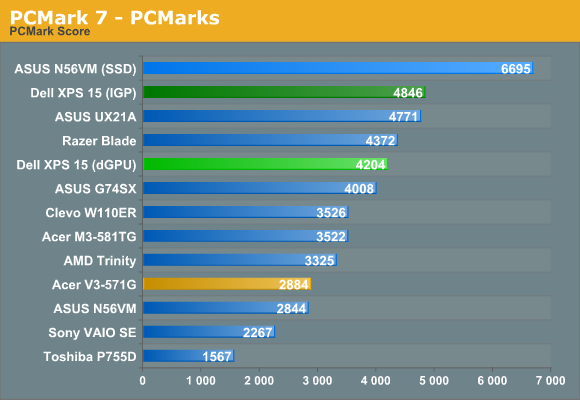
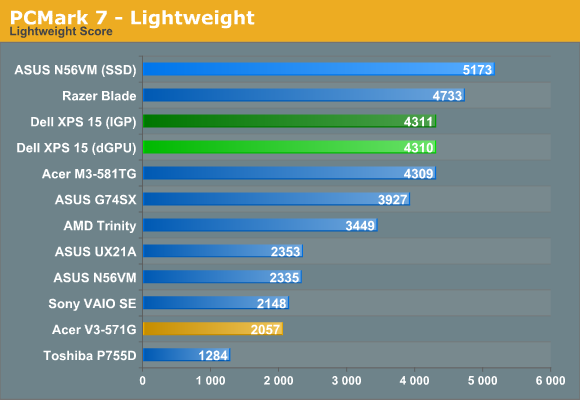
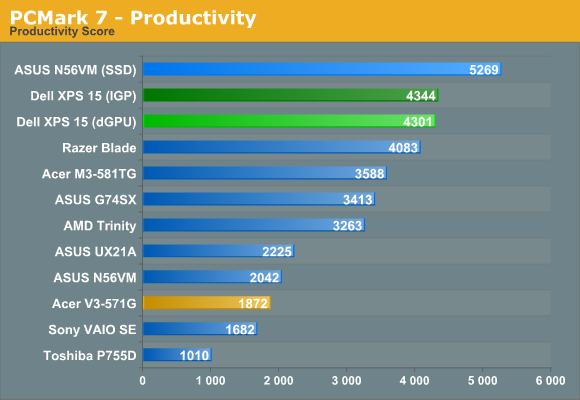
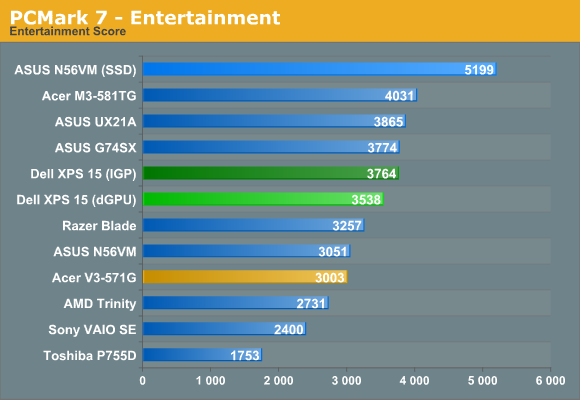
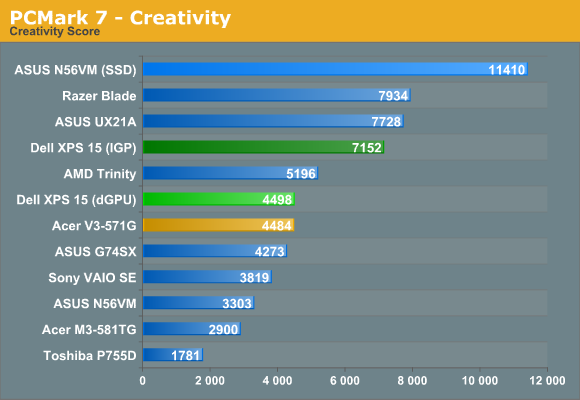
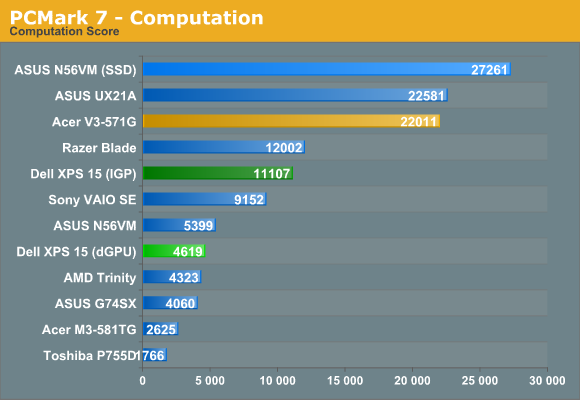
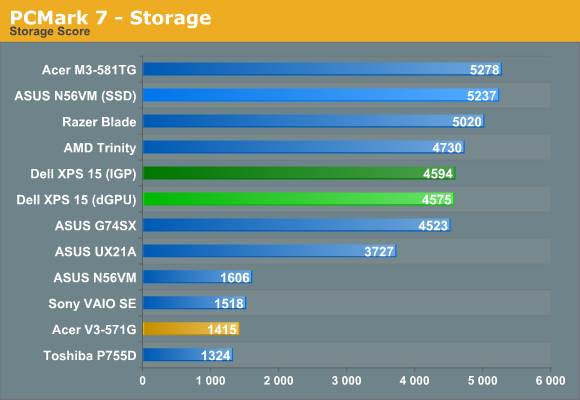
Starting with PCMark 7, our results are actually somewhat surprising. The hybrid Seagate Momentus XT storage in the Clevo W110ER doesn’t improve scores all that much over a typical hard drive (if you can call 25% “not that much”), whereas the 32GB SRT solution in the XPS 15 looks to improve performance by around 75% over an HDD. Of course, if you make the switch to a pure SSD solution (e.g. look at the N56VM scores), PCMark 7’s overall score improves by 135%. That pretty much establishes the expected storage hierarchy: SSD > HDD + SSD Cache > Hybrid HDD > HDD.
There are a few other oddities in the PCMark 7 results worth noting. Both the Creativity and Computation suites benefit tremendously from Intel’s Quick Sync technology. For whatever reason (we tried both the 2696 and 2761 Intel drivers, with similar scores in both cases), the XPS 15 results don’t seem to be in line with other Ivy Bridge laptops. In particular, note how the other three IVB laptops (N56VM, UX21A, and V3-571G) all post Computation scores in excess of 20000, while the XPS 15 has to “make do” with a score of only 11000. This may be yet another instance where throttling is affecting the results, so we’ll wait for updated firmware before trying to draw any final conclusions.
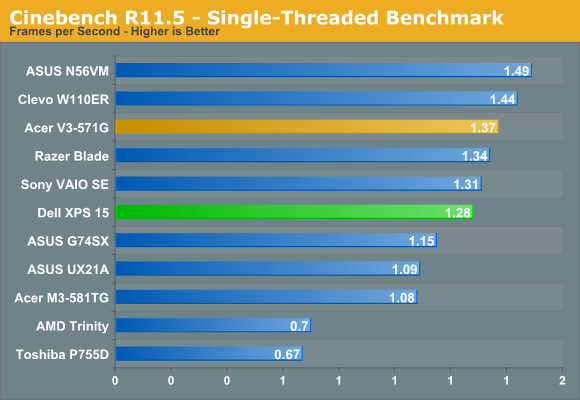
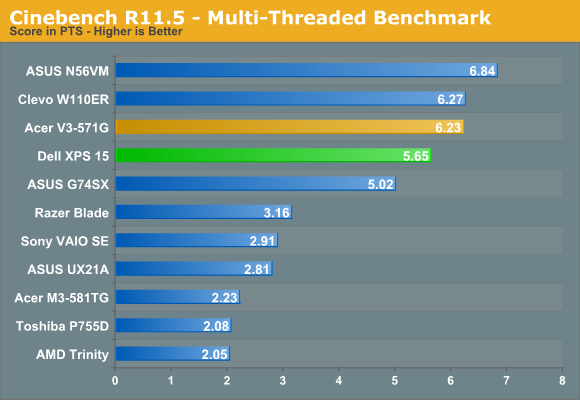
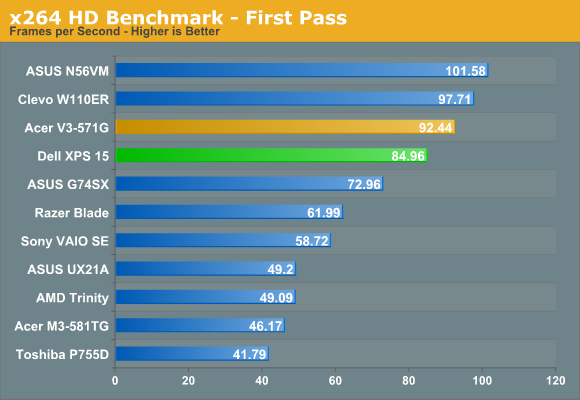
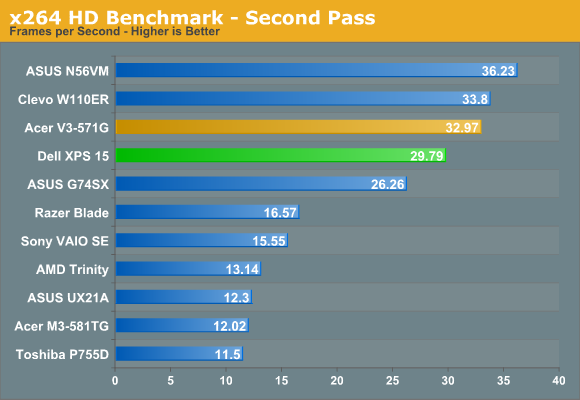
Our CPU-centric tests put the XPS 15 and its 35W i7-3612QM right about where you’d expect. It’s faster than any dual-core processor and outperforms the quad-core Sandy Bridge chips, but it’s a slight step down from the standard voltage 45W IVB quad-cores. Throttling of CPU clocks did not occur during these tests, so it’s only when the CPU and GPU are carrying a significant load the throttling is triggered. As far as we can tell, with the current A04 BIOS, the Dell XPS 15 can pretty much loop a workload like the Cinebench SMP test indefinitely and remain at the maximum Turbo Boost clock (though that may change with updated firmware).
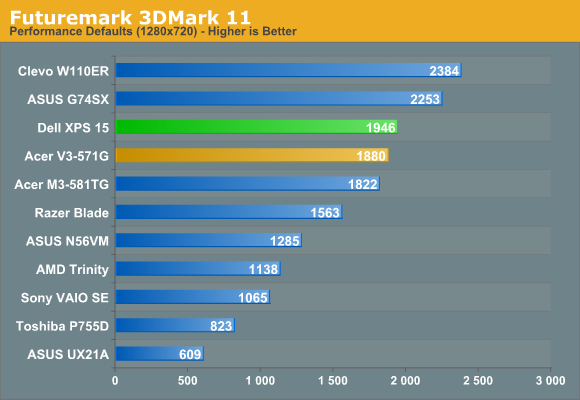
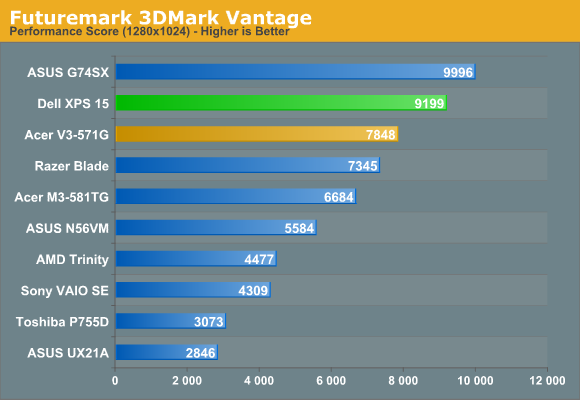
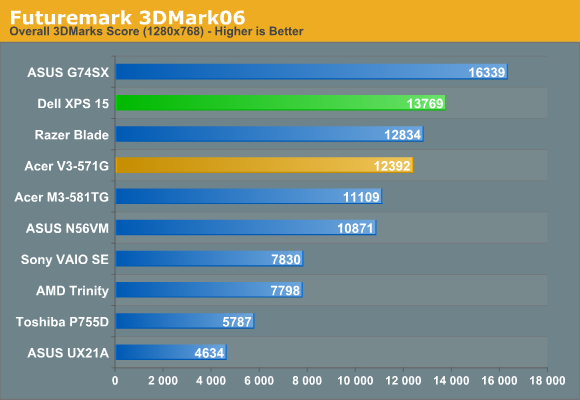
3DMark results also put the XPS 15 and its GDDR5-equipped GT 640M right where you’d expect. It’s a step up in performance over the DDR3-equipped GT 640M in the Acer V3-571G, and it also beats the previous generation GT 555M in the Razer Blade. Meanwhile, the GTX 560M can still win in our synthetic graphics tests, and the GT 650M with GDDR5 also outperforms the XPS 15. There are no real surprises here, but as noted several times already, throttling may be affecting these results—and it’s definitely a factor in the gaming results, which we’ll get to next.










109 Comments
View All Comments
JarredWalton - Wednesday, July 25, 2012 - link
Email Anand or Vivek and tell them to get some Windows Boot Camp numbers! I'd do it myself if I had a Mac, but I'm not willing to buy one just to test Windows. (Note: Vivek *ought* to be doing Windows testing already, so hopefully we'll get numbers sooner rather than later.)ananduser - Friday, July 27, 2012 - link
I think Windows exclusive users should review Windows, like you. We don't want a site like the Verge where dedicated long time Apple fans(aka Verge staff) review Windows in a whimsical fashion.RDO CA - Wednesday, July 25, 2012 - link
Your showing a 16x9 aspect for the AppleTheTechSmith - Wednesday, July 25, 2012 - link
I feel "burned" to use Jarred's words by throttling caused by overheating with my 2008 M1330 :( It's performance has become so bad that after watching YouTube videos for half an hour or so it becomes so slow that I switch to my iPhone. It doesn't help that this computer has the defective Nvidia 8400M GS chip which just adds more heat to the mix and causes it to throttle faster. I've been reading about newer Dell XPS laptops in the user reviews and it's common to see someone complaining of throttling due to overheating. I just don't think Dell has the engineering ability to make a powerful computer compact... The one I have now is probably my last Dell for personal use. To be fair to Dell, my work computer is a Precision M4600, and it is huge but has never let me down. For personal use my next one is probably going to a Retina MacBook Pro.seapeople - Monday, July 30, 2012 - link
Agreed, Dell needs to work on improved cooling/thermals. While playing SCII at 1080p/high settings on my Dell 17" XPS L702x I get good framerates (~45-50 fps), but then after I installed HWMonitor I found that CPU temperatures frequently hit 97C after ~1 hour of playing. After seeing this I now run the game at 99% CPU (which disables turboboost), which still gives me ~40 fps, but temperatures now max out about 79C.If I hadn't installed HWMonitor and noticed these ridiculous temperatures, I'd probably have a dead motherboard in a year, or worse yet just slightly out of warranty.
Sunburn74 - Wednesday, July 25, 2012 - link
Stop mucking about you guys and give the people what they want! A definitive review on the Asus Zenbook Primetahoward - Wednesday, July 25, 2012 - link
Quality chassis material and conservative/good look - CheckGood hardware platform - Check
Adequate platform cooling - Negatory
I really wanted to see this laptop succeed but saw the ship sinking fast after people on notebookreview's forums started reporting on their received units' throttling and "Faraday cage" wifi issues. Reading your stress bench results with throttlestop put the final nail in the coffin; otherwise, I would have returned my mid 2012 cmbp and save a good chunk of change purchasing Dell's l521x.
Guess getting all three of those check boxes checked comes at a premium. One that several people are willing to pay if fulfilled.
pman6 - Thursday, July 26, 2012 - link
form over function.throttling is unacceptable.
i wonder if it can manage not to overheat if the fan is turned to the max.
blackrook - Thursday, July 26, 2012 - link
Are there any plans for a review of the Envy 15? A friend of mine purchased one for ~$1100 recently, and the hardware and aesthetics make it seem as if it would be an interesting alternative, especially with the IPS Radiance screen option.Is HP holding out like they did with the Envy 14 a couple years ago? ;)
JarredWalton - Thursday, July 26, 2012 - link
Pretty much. I had hoped we'd get some of the new HP products for review, but so far hat hasn't happened. We'll keep asking, though.